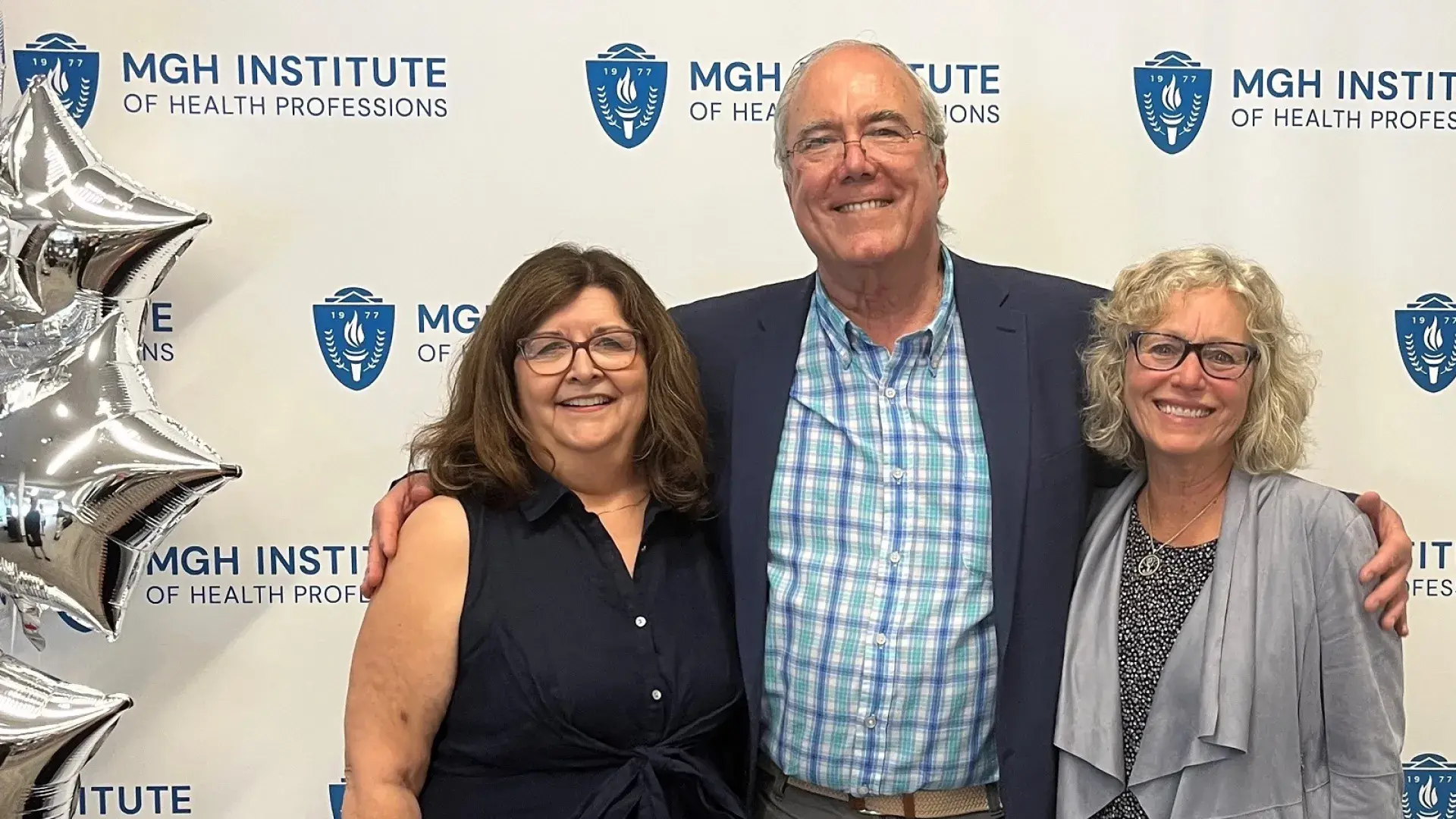
The IHP gathers to say goodbye to Charley Haynes, Susan Fasoli, and Mary Hildebrand as they retire from faculty posts within School of Health and Rehabilitation Sciences
Remarkable faculty are plentiful at the IHP. Many have dedicated years – even decades – to serving the Institute’s students, the community, and their respective fields. Charley Haynes, Susan Fasoli, and Mary Hildebrand are no exception.
Last week inside a packed conference room at 1 CW, the IHP community celebrated their contributions, marking the end of an era and ushering in a new chapter for each: retirement.
“Together, they’ve served the IHP for 48 years,” shared President Paula Milone-Nuzzo at the event. “Our employees, students, and the wider community have benefited greatly from their work and we are so grateful for their service.”
As Haynes shared in his remarks at the ceremony, quoting John Donne:
“No man is an island entire of itself.”
In short, everything is a team effort – here at the IHP, and in life. Community, collaboration, and connection are threads that run through each of these retiree’s stories.
Charley Haynes, Professor of Communication Sciences and Disorders, has a long and storied history at the IHP.
Since joining the Institute in 1992, Charley Haynes has spent nearly half his life as part of this community and was a founding faculty member of the Communication Sciences and Disorders Department and the MS program in Speech-Language Pathology.
Alongside other faculty members in the department, Haynes had to create the program from scratch.
“Many of us shared a then not uncommon history of having to patch together our speech language pathology studies with degrees in reading,” he said. “We pioneered the first speech and language program in the U.S. to offer the option of dual teacher certification in speech language and reading based on a unitary curriculum.”
A thirty-year veteran, Haynes is still driven by the student outcomes he’s witnessed in his time at the IHP. Even now, as he teaches his last course that ends in August, he’s excited about what his students will go offer the communities they serve.
“Many of our former students are now respected language and literacy specialists in different parts of the world,” he shared. “And several are now expert clinicians doing wonderful research. They are all the next generation and are a wonderful affirmation of that early pioneering work we did together here at the IHP.”
Marjorie Nicholas, Chair of the Department of Communication Sciences and Disorders, shared of Haynes:
“His expertise in child language, learning disabilities, and reading disorders like dyslexia became a cornerstone of the curriculum of our newly developed master’s program that gave this fledging program a unique position at the forefront of speech-pathology programs worldwide.”
What will Haynes miss most about the IHP? The community and collaboration.
“The mentorship, the interactions with students I’m hoping to continue,” he said. “But I’ll miss the degree to which I had that connection with students, and the collegial interactions within the culture and community here.”
As she began her first job as a certified occupational therapy assistant in 1980, Susan Fasoli, Professor of Occupational Therapy, never imagined that her career would take her in the directions that it has.
But as she gained more experience in the field, her curiosity as a young OT grew.
“I was motivated to learn and to better understand why and how treatments worked,” Fasoli said. “So, I went back to school. I went back to school again, and then I went back to school again.”
Clinically, Fasoli spent time working in a variety of settings including acute care, inpatient and outpatient rehabilitation, and home care. Her true passion, though, has focused on promoting motor recovery after stroke, and the application of occupation to movement science. A post-doctoral fellowship in mechanical engineering at the Massachusetts Institute of Technology provided the opportunity to direct her OT lens to robot-assisted therapy and rehabilitation technologies. A true academic, she has also held academic and visiting scientist appointments at Worcester State University and Brown University.
Fasoli arrived at the IHP in 2014, alongside the inaugural class of the entry-level OTD program. She was a critical part of the program’s development.
“It's been so rewarding to teach and mentor these young, bright and motivated individuals and to watch them grow into confident OT practitioners,” she said. “I’ll miss these collaborations and connections as I transition to retirement and shift my purpose in life toward more play and less work.”
Eight and a half years ago, Mary Hildebrand, Professor, Occupational Therapy came to the IHP at a friend’s suggestion and has never looked back.
Upon arriving, she was enlightened to see the way the faculty, students, and community worked together.
“At all the other schools where I taught, I was always trying to create collaborations with other faculty in PT, Speech, and Nursing,” she said. “But here at the IHP it is intentional – it is a part of our DNA.”
Hildebrand was a mother of young children when she went to OT school, and as such, caregiving has always played a role in her work. From student mentorship, to leading the OT CLiPR, she’s served the IHP community immensely in her time at the Institute.
Hildebrand notes how important education has been to her and her family. Now, she and her three siblings are all teachers as a result of the emphasis her parents put on learning in her early life.
“I hope that I imparted some of this love of education and joy in lifelong learning, not only to my daughters but to all of my students.”
Hildebrand looks forward to bettering the “occupational balance” in her life as she takes on this next chapter. Spending time with family, and especially her grandchildren, is a top priority.
Do you have a story the Office of Strategic Communications should know about? If so, email ihposc [at] mghihp.edu
